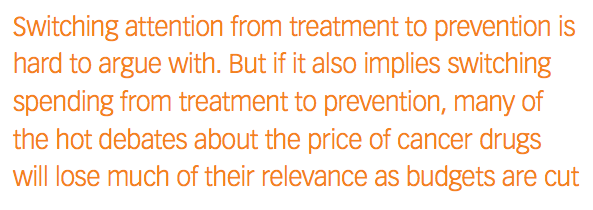The Cancer Care Conundrum in Europe
Pharmaceutical Executive
Cancer treatment is an increasing dilemma for EU health services as they try to balance patient care against budgetary constraints.
The significance of cancer for health services is not just its impact on the population-which is severe enough since it is now the most common cause of death and morbidity in Europe after cardiovascular disease-but cancer treatment also poses in its most acute form, the dilemma that health services face as they try to balance patient care against budgetary constraints.
It is now widely recognized that cancer causes the equivalent of 25 million years of healthy life lost due to ill-health, disability and death across the European population. Its economic burden is estimated at €126 billion every year in the European Union (EU), in direct healthcare costs and in the losses that disease and consequent disability pose to the overall economy. And the combination of unhealthy lifestyles and demography means that the challenge is likely to grow in the coming years. Already, incidence has risen across Europe by 30% in the last 20 years.
At the same time, the scientific and technological revolutions that are driving the many advances in cancer treatment are opening up new possibilities for meeting the challenge-but in many cases at a high financial cost. It is in the field of cancer that genomics and precision medicine are offering radical new opportunities. It is also in the field of cancer that products are becoming commonplace with price-tags so high that they would have been unthinkable less than a decade ago. Global spending on oncology drugs rose to $100 billion in 2014, and is rising at 6% a year in Germany, France, Italy, Spain and the UK. As a result, cancer treatment has become the leading battleground for the clash between what health services aspire to do and what health services can afford to do.
Paradoxically, advances in successful treatment exacerbate the challenge. There are an estimated 10 million cancer survivors in Europe now who, before improvements in treatment were available, would have died. The achievement is obviously to be applauded, but it, nonetheless, leaves health services facing additional demands for continuing treatment that would otherwise not have existed.
Consequently, the discussion of cancer strategy provides a sharp focus on the discussion of how to make the best possible allocation of limited health services resources. The increasing pressure on authorities responsible for approving, organizing and funding treatment is driving cancer rapidly up the policy agenda in Europe. Questions are being asked more frequently about whether staff and equipment are being used most effectively, and whether investments in services and treatment and infrastructure are providing the best value-as well as the broader question of whether the level of overall resourcing is sufficient.
Quality levels vary
Part of the battle will be to equalize the quality and effectiveness of care in Europe. The divergences across EU member states in outcome and survival are well documented-with the UK and Denmark performing worse than the EU average for cancer of the colon, lung, breast and prostate, and with Poland having the worst survival rates for all cancer types other than breast cancer in women. Spending on cancer care as a share of total healthcare expenditure also varies widely, from 8% in Poland and 7% in Germany to 3% in Denmark and Sweden.
And among the many variables in the equation, access to new medicines varies widely, both between countries and within them-and captures much of the headline attention in health policy debates. The barriers to uptake are being identified with increasing precision: differing frequencies of updating guidelines; diverse pricing and reimbursement arrangements-for diagnostics and devices as well as for medicines-and the lengthy and often tense negotiations entailed; differing evaluations of the evidence required in decision-making; and expenditure caps. But if the barriers are being identified more clearly, action to lift them is slower to materialize.
Product purging
The results of the persistent uncertainties emerge day after day. In early October, the UK’s National Institute for Health and Care Excellence (NICE) refused to endorse the use of Merck Sharp and Dohme’s €50,000 per-patient, per-year immunotherapy product, Keytruda, in advanced lung cancer on the grounds that there is currently no “robust data on the long-term benefits.” And Germany’s drug funding board, the G-BA, ruled that Eli Lilly’s monoclonal antibody, Cyramza, was not cost-effective in treating advanced or metastasized non-small-cell lung cancer.
During the summer, the French health ministry began selective delisting of a number of cancer drugs, including Avastin and Herceptin, putting into effect a tough new regime agreed in the spring to ease the impact of expensive cancer drugs on hospital budgets. It also rejected Roche’s Perjeta as a treatment before breast cancer surgery, on grounds of insufficient evidence of benefit-following similar judgements by Germany and the UK earlier in the year. NICE is reassessing all 29 drugs paid for by its now-defunct special fund for cancer drugs-which became too expensive to sustain. Patient and consumer groups have accused the English authorities of being overly strict in their demands for evidence of effectiveness.
Ideas for improvement
A recent study from the Office for Health Economics (OHE) in the UK draws attention to the lack of studies that quantify the inefficiencies hindering effective care. It highlights the void over one of the great controversies-whether cancer care should be more centralized.
But it does not hesitate to list what it sees as areas of care where efficiency could be improved. These range from the organization and planning of services and ensuring early diagnosis to the uptake of new medicines in the delivery of treatment.
Encouragement is given to cutting waiting times, improving data use to provide indicators of quality of care, and to closer coordination and integration of care across specializations or silo-like administrative responsibilities.
In particular, the OHE study urges health technology assessment bodies to widen their approach to evaluation of new medicines. It argues that better use should be made of real-world evidence in decision-making, so as to better understand real treatment effects and to support streamlined or managed entry schemes.
“This is imperative to ensure we are investing in effective and cost-effective treatments, in order to improve the efficiency of healthcare spend,” the study says. Collection of real-world data in cancer is relatively advanced compared with other fields, it goes on, but “there is considerable room for improvement.” And while measuring clinical outcomes, authorities should also take into account the impact on quality of life, lost productivity and caregiver time.

But perhaps the most telling recommendation comes from the study’s estimate that a 25% reduction in smoking prevalence across major European countries would result in a 20% decrease in lung cancer mortality and cost savings of €6 billion. This chimes with a seismic shift underway in the health community in response to the overwhelming evidence that environmental factors and lifestyles are dominant factors behind so many cancer diagnoses. And it is all the more telling since OHE owes its genesis to the UK drug industry body.
Paying the price
Switching attention from treatment to prevention is hard to argue with from any standpoint. But if it also implies switching spending from treatment to prevention, many of the currently hot debates about the price of cancer drugs will lose much of their relevance as drug budgets are cut. And that is a prospect that will make many pharmaceutical executives around Europe deeply uncomfortable.
Reflector is Pharmaceutical Executive’s correspondent in Brussels

FDA Outlines Updated Requirement for Placebo-Controlled Trials in Vaccine Research
May 21st 2025In an article recently published by The New England Journal of Medicine, FDA higher-ups Vinay Prasad, MD, MPH; and Martin A. Makary, MD, MPH, wrote that any new COVID-19 vaccine must now be evaluated in placebo-controlled studies.
Addressing Disparities in Psoriasis Trials: Takeda's Strategies for Inclusivity in Clinical Research
April 14th 2025LaShell Robinson, Head of Global Feasibility and Trial Equity at Takeda, speaks about the company's strategies to engage patients in underrepresented populations in its phase III psoriasis trials.
Beyond the Prescription: Pharma's Role in Digital Health Conversations
April 1st 2025Join us for an insightful conversation with Jennifer Harakal, Head of Regulatory Affairs at Canopy Life Sciences, as we unpack the evolving intersection of social media and healthcare decisions. Discover how pharmaceutical companies can navigate regulatory challenges while meaningfully engaging with consumers in digital spaces. Jennifer shares expert strategies for responsible marketing, working with influencers, and creating educational content that bridges the gap between patients and healthcare providers. A must-listen for pharma marketers looking to build trust and compliance in today's social media landscape.